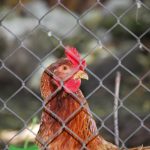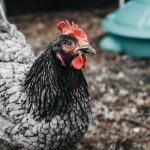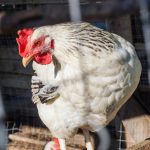Creating a comfortable coop environment for your chickens is essential for their overall well-being and productivity. The coop should be well-ventilated to ensure proper air circulation and prevent the buildup of harmful gases. It should also be insulated to provide protection from extreme temperatures, keeping the chickens warm in the winter and cool in the summer. Additionally, the coop should be predator-proof to keep your chickens safe from potential threats such as foxes, raccoons, and birds of prey.
In addition to providing a safe and secure environment, it’s important to keep the coop clean and dry. Regularly cleaning out droppings and soiled bedding will help prevent the spread of disease and parasites, as well as reduce odors. Providing comfortable roosting bars and nesting boxes will also contribute to a cozy and inviting environment for your chickens. Adding bedding such as straw or wood shavings will give them a soft and comfortable place to rest and lay eggs. Overall, creating a comfortable coop environment is crucial for the health and happiness of your flock.
Table of Contents
Providing Nutritious Feed and Fresh Water
Providing your chickens with nutritious feed and fresh water is essential for their overall health and well-being. A balanced diet is crucial for egg production, growth, and overall vitality. A good quality commercial feed that is specifically formulated for chickens should be the foundation of their diet. This feed should contain a balance of protein, carbohydrates, vitamins, and minerals to meet their nutritional needs. Additionally, supplementing their diet with fresh fruits and vegetables, as well as occasional treats such as mealworms or scratch grains, can provide added nutrients and variety.
Fresh water should be available to your chickens at all times. Water is essential for digestion, temperature regulation, and overall health. It’s important to regularly clean and refill their water containers to ensure that it is free from contaminants and debris. In colder climates, heated waterers can prevent freezing during the winter months. Overall, providing nutritious feed and fresh water is crucial for the health and productivity of your flock.
Ensuring Adequate Space for Roaming and Dust Bathing
Ensuring adequate space for your chickens to roam and dust bathe is essential for their physical and mental well-being. Chickens are natural foragers and enjoy scratching and pecking at the ground in search of insects, seeds, and plants. Providing them with access to a spacious outdoor area will allow them to exhibit natural behaviors and engage in physical activity. This will not only keep them physically fit but also mentally stimulated.
In addition to roaming space, chickens also require a designated area for dust bathing. Dust bathing is an important behavior that helps chickens maintain healthy feathers and skin by removing excess oil and parasites. Providing a designated area filled with fine dust or sand will allow your chickens to engage in this natural behavior. Ensuring adequate space for roaming and dust bathing is crucial for the overall well-being of your flock.
Offering Enrichment Activities and Toys
Offering enrichment activities and toys is important for keeping your chickens mentally stimulated and preventing boredom. Chickens are intelligent animals that benefit from mental stimulation and environmental enrichment. Providing them with toys such as hanging mirrors, pecking blocks, or treat dispensers can provide entertainment and encourage natural behaviors such as pecking, scratching, and exploring.
In addition to toys, providing environmental enrichment such as perches, logs, or branches can create a more dynamic living space for your chickens. These additions can provide opportunities for exercise, exploration, and social interaction. Overall, offering enrichment activities and toys is important for keeping your chickens happy, healthy, and engaged.
Monitoring for Signs of Stress or Illness
Monitoring your chickens for signs of stress or illness is crucial for early detection and treatment. Chickens are prey animals that are skilled at hiding signs of weakness or illness, so it’s important to be vigilant in observing their behavior and physical condition. Common signs of stress or illness in chickens include lethargy, decreased appetite, abnormal droppings, respiratory issues, abnormal posture or movement, feather loss, or changes in vocalization.
Regularly observing your flock and conducting health checks can help you identify any potential issues early on. It’s important to establish a baseline for what is normal behavior and appearance for your chickens so that you can quickly recognize any deviations. Additionally, keeping detailed records of their health and behavior can help you track any changes over time. Overall, monitoring for signs of stress or illness is crucial for maintaining the health and well-being of your flock.
Establishing a Consistent Routine for Care and Maintenance
Establishing a consistent routine for care and maintenance is important for the overall health and well-being of your flock. Chickens thrive on routine and predictability, so providing them with consistent care can help reduce stress and promote a sense of security. This includes feeding them at the same time each day, cleaning their coop on a regular schedule, providing fresh water daily, and conducting health checks on a routine basis.
In addition to daily care, it’s important to establish a consistent routine for maintenance tasks such as coop repairs, parasite prevention, and seasonal adjustments. Regularly inspecting the coop for wear and tear, addressing any structural issues promptly, and implementing a regular parasite prevention program can help ensure a safe and healthy living environment for your chickens. Overall, establishing a consistent routine for care and maintenance is crucial for the long-term health and happiness of your flock.
Seeking Veterinary Care and Consultation
Seeking veterinary care and consultation is important for maintaining the health of your flock. While preventative care and regular monitoring are essential components of chicken health management, there may be times when professional veterinary care is necessary. It’s important to establish a relationship with a veterinarian who has experience with poultry and can provide guidance on preventative care, treatment options, and emergency care.
Regular check-ups with a veterinarian can help ensure that your flock is healthy and free from disease or parasites. Additionally, seeking veterinary consultation when you notice any signs of illness or injury can help prevent further complications and promote timely treatment. It’s important to have a plan in place for emergency veterinary care in case of sudden illness or injury. Overall, seeking veterinary care and consultation is an important aspect of responsible chicken ownership that can help ensure the long-term health and well-being of your flock.
In conclusion, creating a comfortable coop environment, providing nutritious feed and fresh water, ensuring adequate space for roaming and dust bathing, offering enrichment activities and toys, monitoring for signs of stress or illness, establishing a consistent routine for care and maintenance, and seeking veterinary care and consultation are all essential components of responsible chicken ownership. By prioritizing the health and well-being of your flock through these practices, you can ensure that they lead happy, healthy lives while also maximizing their productivity as egg-layers or meat producers. Ultimately, providing proper care for your chickens is not only a responsibility but also a rewarding experience that allows you to form a strong bond with these unique and fascinating animals.
Meet Walter, the feathered-friend fanatic of Florida! Nestled in the sunshine state, Walter struts through life with his feathered companions, clucking his way to happiness. With a coop that’s fancier than a five-star hotel, he’s the Don Juan of the chicken world. When he’s not teaching his hens to do the cha-cha, you’ll find him in a heated debate with his prized rooster, Sir Clucks-a-Lot. Walter’s poultry passion is no yolk; he’s the sunny-side-up guy you never knew you needed in your flock of friends!







